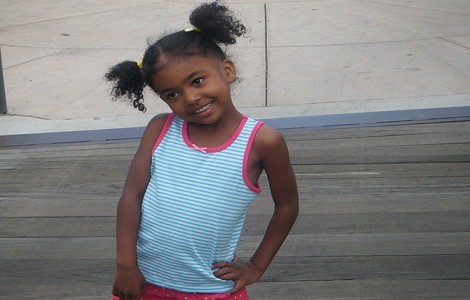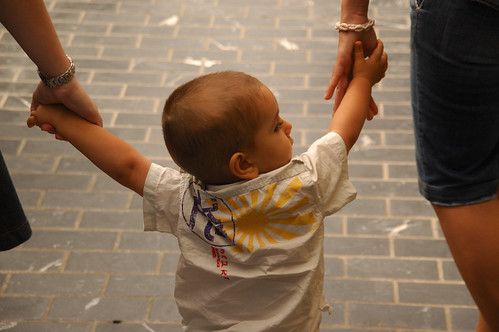|
Kids need to learn there are consequences for every action. But what if time-outs just aren't cutting it? Do you revert to spanking? If your opinion on that method is like mine, then spanking is not an option. For some it might be. But I personally believe it isn't necessary. So what do you do when you feel this way? As an experienced mom, I can tell you there are many alternatives appropriate for each unique situation.
My kid is not phased by time-outs. Some kids just won't sit still in time out, especially smaller kids who are full of energy. Yet others don't seem to really care one way or the other and may go back to the behavior that them into it in the first place. If time-outs won't cut it for your kid, you do have other options. Time-out can be a good aid when it comes to disciplining kids. But it certainly is not the be all and end all and spanking is not the only alternative. Spanking? No way! Each person has their own method and some, like me, are not fond of spanking. If you don't want to use this method and time-outs are not working, don't worry. There are plenty other methods to use. While it sometimes seems so, spanking and time-outs are far from the only options when it comes to discipline. I prefer to use positive discipline with my kids, which basically refers to any method that teaches the lesson in a positive way. Think about the offense. When you want to teach your child a lesson, think about what was done first. The punishment should fit the crime. Don't be too harsh for a mild offense. This could actually cause resentment instead of teaching your child a lesson. At the same time, don't take serious offenses too lightly. The point is to teach kids there are consequences and also to teach them how to learn from their mistakes. If you want to follow positive parenting methods, whatever method you choose should involve something that will do both in a positive way. Why did your child misbehave? Before you can come up with a plan that will teach your child a lesson, you first need to know the reason for the ill behavior. Was your child simply confused at the correct behavior? Did the child not realize the action was wrong? Did the child feel bullied or pressured? Was the child purposefully acting out or being mean? Think about what led to the misbehavior and develop your action plan from there. What lesson are you trying to teach? Are you trying to teach your child to think about a better response next time? Are you trying to teach your child what's right and what isn't? Is your child hitting and you want to instill why that isn't a good thing to do? Do you want your child to know that walls are not for coloring, but coloring books are perfect for it? Think about the exact lesson you want your child to gain and go from there. Put it all together. I find that when I consider the offense, the reason behind it, and what lesson I need my kids to learn, I come up with the best course of action. Sometimes, when in the heat of the moment and trying to think quick, parents can make the wrong discipline choices. We've all been there. Parenting is always a work-in-progress and we live and learn. Each family will have a different course of action that works for them in each situation. The important thing is that your motive always remains to do what's in the best interest of your child. More from Lyn: Positive Parenting Does Not Mean Zero Discipline Easy Discipline Tricks for Babies Guide to Positive Discipline for Children *Note: The author's positive parenting method has evolved into what she calls Upstream Parenting. *I originally published a version of this via Yahoo Contributor Network
0 Comments
With the news of Amy Chua's Tiger Mother parenting spreading like wildfire, people are starting to look at the extremes of parenting from all sides. Because I subscribe to my own self-created positive parenting methods, I have been questioned by readers about discipline. Many have made assumptions that positive parenting methods do not offer discipline and that children are being catered to. I cannot speak for all parents. However, my positive parenting methods definitely involve discipline.
What is positive parenting? Positive parenting is a method in which guardians choose to guide children without force. It is about looking for ways to teach and parent children that stimulate positive reactions, behaviors, and lessons. In positive parenting, the goal is to teach children how to resolve issues, control emotions and behaviors, and relate to others in a way that brings about a positive result. What is discipline? Discipline is the act of teaching the consequences of actions. Discipline is necessary in showing children what happens when they do or don't do certain things throughout life. Children who receive zero discipline may fail to fully understand why certain behaviors and actions are inappropriate. Some misconceptions about positive parenting and discipline:
What is positive discipline? In positive parenting, the goal is not to avoid discipline, but to use it in a way that is productive in a good way. There is not one positive method that will work in every situation. In fact, for discipline to trigger a positive and productive response from children, it should be geared toward each unique situation. Also, remember that that each child has unique needs, depending on age, abilities, mental and social state, and more. You know your child best. When choosing discipline methods that will teach the lesson, as well as create a positive result, think of the situation itself, as well as what is most likely to work for your child. For instance, a timeout might work work well for one two year old. But drawing an apology picture or getting a privilege or toy taken away may work for another. Is there a such thing as negative discipline? Of course. Negative discipline is that which either harms the child or does not effectively teach the lesson. It can also be both. Some parents may find that spanking their children only makes them fearful in their presence and also teaches their children to hit others in order to solve a problem. If this is the case in your home, you have found a negative discipline method. Any method that causes another harm or creates more issues than it solves is a negative form of discipline. How can my family start using positive discipline? One of the easiest ways I have recommended to those new to positive parenting is to start a Parenting Mistake Journal. Take down all the issues in your home each day and what you did to solve the issues. Look over the issues and observe the kids to see whether your discipline techniques had a positive or negative impact. If the results from your actions turn out negative or the problem was not really resolved, try to think of a more positive way to turn things around. Do this daily until you get to a point where you no longer need a journal to figure things out. Note: The author's positive parenting method has evolved into what she calls Upstream Parenting. *I originally published this via Yahoo Contributor Network Spanking does more harm than good. I know that I will upset some people with that statement. But due to my long-term experience with kids, there's no way I can come to any other conclusion. Not only am I parent to many, but I also have nannied and babysat many children.
We all want our kids to be respectful, upstanding citizens. But is spanking really the best way to do that? While kids may listen to an order after being spanked, that doesn't mean this is the best method of discipline. Short-term effectiveness means nothing, as far as long-term lessons and damage. There are several reasons I've come to the same conclusions time and again. In fact, in all of my years of being around children, in every single case where spanking is used as a form of discipline, every one of the following reasons I won't spank comes into play. Spanking can cause a dangerous fear. In my observance of those who have been spanked, they listen only because they are afraid -- and only when they know someone is around that will deliver that form of punishment. The behavior is often repeated when the child no longer has a fear of receiving that punishment. This can cause the child to misbehave for others. These children often fear not only the punishment, but the deliverer of said punishment. In many of these instances, if a child needs to confide in someone (even about dangerous issues like bullying), they often will not do so out of fear. This is very dangerous territory for a parent. A child cannot fear the person they should be able to come to for help and advice. Spanking can cause misconceptions regarding hitting. Another issue that is very common among spanked children is the resolution of problems through violence. Time and time again, I see children who are spanked hitting friends, siblings, and sometimes authority figures when things don't go the way they'd like. By hitting a child as a means of solving a problem, you are teaching that child to hit other people if they don't do what they want them to. That is not the way to lead a productive citizenship among society. Imagine if your boss at work slapped you every time he/she wasn't happy with the way you handled something. Spanking your child is exactly the same thing. Spanking can lead to bullying. An extensive study found that kids who were spanked were twice as likely to participate in aggressive behaviors, such as bullying, fighting, and otherwise being mean to other kids. Children who were spanked by the age of three were highly likely to bully by the age of five. This goes back to the previous point that when you teach a child they will be hit when they don't do what they are told, they learn that this is the way to treat others as well. You can't go around hitting everyone that doesn't do what you tell them. Children are not robots. Why do some parents feel that children are supposed to do each and every thing we order them to do? Some things make sense, especially when you are teaching safety and responsibility. However, as parents, we should be raising our children to think for themselves so that they know how when they go out on their own in the world. They can't go out into the streets and just say yes to everything other people tell them. Also, everything will not be handled by others. They need to know how to do things for themselves and figure out how to make it. Zero Spanking Does Not Mean Zero Discipline. I wish I had a dollar for every time someone made statements implying that just because I don't spank my children, they wouldn't learn a lesson or be well-behaved. Many of these same people are dealing with kids who have been in trouble for fighting, bearing weapons, and other violent or destructive behavior. Positive Parenting Does Not Mean Zero Discipline. Discipline should not be done to prove a point or come out of frustration. Appropriate disciplinary techniques should be unique to the specific situation and produce a positive and productive result. Just because someone does not spank does not mean their children don't have consequences. In fact, children who aren't spanked but are given alternative consequences have always learned the lesson faster, in my experience. This is because when you give a child a consequence that is related to the situation, it causes them to actually think of the situation itself, rather than the punishment. The above said, I am a firm believer that there is more than one way to parent a child and I don't look down on those who choose to use methods other than those I use with my own children. |
Instant Download On Order
Categories
All
Archives
May 2024
|
- Brand Shamans
- Brand Healing
- Inner Healing
-
INTENT-SIVE NATURE
- Content & Brand Elevation
- Healing Jewelry & Talismans
- Bath, Beauty, & Self-Care
- Healing Sessions
- Rituals, Herbs, & Altar Supplies
- Gawwwdess Baby Boutique
- Soul Flame Gifts
- Yoga & Meditation
- Books & Media
- Education & Homeschool Resources
- Home, RV, & Decor
- Clothing
- Pets
- Custom Orders
- Monthly Subscription Boxes
- October Festivals
- FLOW-Key Parenting
- About & Contact
- RV, Nature, & Travel Shamans
- Souls Within
- Life & Home
- Heart 'N Mind Homeschool
- The Homeschooling Mommy
- Books & Authors
- Speak Up!
- Pawsitive Pet Parenting
- Manifesterz
- Gifts In Minutes
- Brand Shamans
- Brand Healing
- Inner Healing
-
INTENT-SIVE NATURE
- Content & Brand Elevation
- Healing Jewelry & Talismans
- Bath, Beauty, & Self-Care
- Healing Sessions
- Rituals, Herbs, & Altar Supplies
- Gawwwdess Baby Boutique
- Soul Flame Gifts
- Yoga & Meditation
- Books & Media
- Education & Homeschool Resources
- Home, RV, & Decor
- Clothing
- Pets
- Custom Orders
- Monthly Subscription Boxes
- October Festivals
- FLOW-Key Parenting
- About & Contact
- RV, Nature, & Travel Shamans
- Souls Within
- Life & Home
- Heart 'N Mind Homeschool
- The Homeschooling Mommy
- Books & Authors
- Speak Up!
- Pawsitive Pet Parenting
- Manifesterz
- Gifts In Minutes




 RSS Feed
RSS Feed





